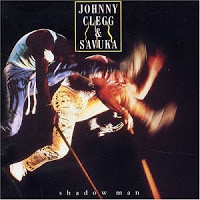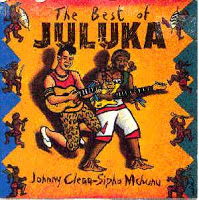Dernière mise à jour : septembre 20th, 2015 at 09:11 am
Septième et dernière bulle sud africaine en compagnie du plus connu des auteurs-compositeurs-chanteurs sud africains : Johnny Clegg ! Retour sur les trente années de carrière d’un musicien atypique dont les différents groupes (“Juluka”, “Savuka”) et la musique ont été et sont les dignes représentant d’un pays multiracial et multiculturel.
Seventh and last South African bubble with the best-known South African singers and songwriters: Johnny Clegg! Flashback on the thirty year career of a musician whose atypical bands (“Juluka”, “Savuka”) and music have been and are worthy representative of a multiracial and multicultural country.
More in English >>
Playlist BULLES DE CULTURE – Johnny Clegg
Né le 7 juin 1953 En Angleterre, Jonathan Clegg, dit Johnny Clegg, va vivre tour à tour au Zimbabwe (7 ans), en Zambie (2 ans) puis définitivement en Afrique du Sud. Fasciné très tôt par l’Afrique, Johnny Clegg va peu à peu s’intéresser à l’univers zoulou par la musique, par des études d’anthropologie et à partir de sa rencontre avec un musicien de rue, Mntonganazo Mzila. Cette première amitié zoulou sera suivie par la rencontre avec le musicien Sipho Mchunu. La passion de l’un pour la musique celte et de l’autre pour la musique zoulou va donner naissance au premier groupe multiracial du pays : “Juluka” (
sueur en zoulou), dont le premier album, “Universal Men”, sera vite censuré par les autorités peu enclines aux mélanges culturels sous l’apartheid. Le “Zoulou blanc” est né ! Mais malgré les succès aux niveaux national et international, le groupe est dissous en 1985 quand Sipho Mchunu décide de retourner vivre dans sa communauté. En 1986, Johnny Clegg est donc obligé de former un nouveau groupe : “Savuka” (
nous sommes nés, nous sommes réveillés en zoulou), dont le premier album, “Third World Child” (1987), rencontrera immédiatement le succès avec les deux titres phares “Asimbonanga” (chanson dédiée à Nelson Mandela emprisonné) et “Scatterlings of Africa” (chanson sur les dispersés d’Afrique). Enfin, en 1993, Johnny Clegg arrêtera le groupe et poursuivra une carrière solo.
Widgets Amazon.fr
Tout d’abord, deux conseils d’albums pour découvrir l’univers du premier groupe de Johnny Clegg : “The Cologne Zulu Festival (Juluka en duo avec Ladysmith Black Mambazo)” (album de musique traditionnelle zoulou) et “Crocodile Love/Ya Vuka Inkunzi” (album paru lors de la reformation temporaire du groupe douze ans après sa dissolution).
Ensuite, pour appréhender la seconde partie de la carrière de Johnny Clegg avec “Savuka”, ce sera : “Heat, Dust And Dreams” (album vainqueur aux Etats-Unis du Billboard Music Award pour le meilleur album du monde en 1993).
Enfin, pour découvrir toute la carrière de Johnny Clegg, il y a le double album retraçant ses trente ans de carrière : “Spirit is the journey” (2010).
Enjoy!
jici
Remerciements à Jérôme
Webographie :
– http://fr.wikipedia.org/wiki/Johnny_Clegg ;
– http://www.johnnyclegg.com (site officiel) ;
– http://inmyafricandream.free.fr ;
– http://en.wikipedia.org/wiki/Sipho_Mchunu ;
– http://fr.wikipedia.org/wiki/Juluka ;
– http://fr.wikipedia.org/wiki/Savuka ;
– http://en.wikipedia.org/wiki/Billboard_charts.
Bibliographie : “Johnny Clegg, la passion zoulou”, Philippe Conrath, édition Seghers, postface de Renaud, 1988.

Born in June 7, 1953 in England, Jonathan “Johnny” Clegg will live alternately in Zimbabwe (7 years), Zambia (2 years) then permanently in South Africa. Very early fascinated by Africa, Johnny Clegg will gradually be interested in the Zulu world through music, through his anthropology studies and from his encounter with a street musician, Mntonganazo Mzila. This first Zulu friendship will be followed by the encounter with the musician Sipho Mchunu. The passion of one for Celtic music and the other for Zulu music will create the first multiracial group of the country: “Juluka” (
sweat in Zulu), whose first album, “Universal Men”, will soon be censored by the authorities who doesn’t want cultural exchanges under apartheid. The “White Zulu” is born! But despite the national and international successes, the band disbanded in 1985 when Sipho Mchunu decided to return to live in his community. In 1986, Johnny Clegg is therefore obliged to form a new group: “Savuka” (
we have risen in Zulu), whose first album, “Third World Child”(1987), meet with immediate success with the two hits “Asimbonanga” (song dedicated to Nelson Mandela in prison) and “Scatterlings of Africa”. Finally, in 1993, Johnny Clegg stop the group and pursue a solo career.
Widgets Amazon.fr
Firstly, two advices of albums in order to discover the world of the first group of Johnny Clegg: “The Cologne Zulu Festival (Juluka duet with Ladysmith Black Mambazo)” (Zulu traditional music album) and “Crocodile Love/Ya Vuka inkunzi” (album released during the temporary reformation of the band after twelve years of separation).
Then, to understand the second part of the career of Johnny Clegg with “Savuka”, it will be: “Heat, Dust And Dreams” (album winner of the U.S. Billboard Music Award for best album of the world in 1993).
Finally, to discover all the career of Johnny Clegg, there is the double album retracing his thirty year career: “Spirit Is The Journey” (2010).
Enjoy!
jici
Thanks to Jérôme
Playlist BULLES DE CULTURE – Johnny Clegg
Webography :
– http://en.wikipedia.org/wiki/Johnny_Clegg ;
– http://www.johnnyclegg.com (official website) ;
– http://inmyafricandream.free.fr ;
– http://en.wikipedia.org/wiki/Sipho_Mchunu ;
– http://en.wikipedia.org/wiki/Juluka ;
– http://en.wikipedia.org/wiki/Savuka ;
– http://en.wikipedia.org/wiki/Billboard_charts.
Bibliography: “Johnny Clegg, la passion zoulou”, Philippe Conrath, édition Seghers, postface de Renaud, 1988.
Accro aux films, aux pièces de théâtre, aux séries et à la culture en général, j'aime les œuvres qui me surprennent.
Top 3 Cinéma : "À bout de souffle" (1960), "Blade Runner" (1982), "Casablanca" (1942)
Top 3 TV : "Engrenages" (2005-...), "The Wire" (2002-2008), "Twin Peaks" (1990-1991)
Les derniers articles par Jean-Christophe Nurbel
(tout voir)
 Bulles de Culture Sur Bulles de Culture, chaque jour, la culture sort de sa bulle !
Bulles de Culture Sur Bulles de Culture, chaque jour, la culture sort de sa bulle !


